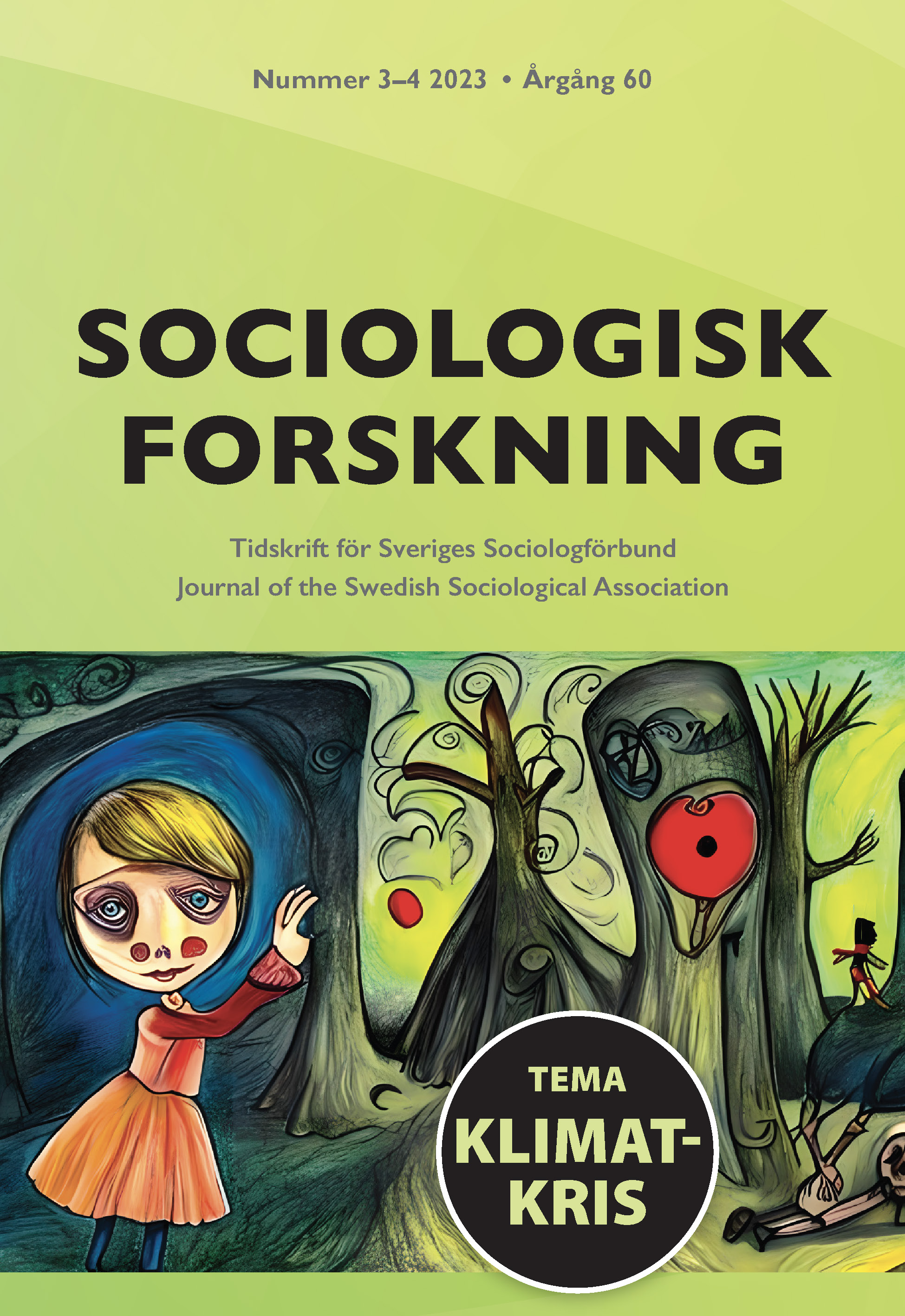A speculative conversation on climate change and sociology
DOI:
https://doi.org/10.37062/sf.60.25402Nyckelord:
normativity, philosophy of science, climate crisis, climate sociology, future of sociologyAbstract
This article provides a diverse range of insights into the question of how sociology can and should contribute to research on climate change. It takes an unconventional and unique approach to doing so, through a stylized conversation between the authors, which is based on an open-ended focus group discussion. The conversation illuminates different perspectives on if and how to research climate change and the climate crisis from a sociological perspective. We delve into issues of normativity in sociological research, discuss the benefits and pitfalls of several methodological approaches, theorize about how climate change might affect sociology in the decades to come, as well as how sociology needs to further develop in order to stay a relevant discipline for this grand societal challenge. We conclude not with suggestions for future research, but with a call for further reflective conversation on these topics, both within and outside of sociology.
Referenser
Alexander, S. (2021) Beyond capitalist realism. The politics, energetics, and aesthetics of degrowth. Melbourne: The Simplicity Institute.
Bowden, G. (2017) An environmental sociology for the Anthropocene. Canadian Review of Sociology, 54 (1):48-68. https://doi.org/10.1111/cars.12138.
Davidson, D. (2022) Climate change sociology: Past contributions and future research needs. PLOS Climate, 1 (7):1-3. https://doi.org/10.1371/journal.pclm.0000055.
De Freitas Netto, S.V., Sobral, M.F.F., Ribeiro, A.R.B., Soares, G.R.D.L. (2020) Concepts and forms of greenwashing: A systematic review. Environmental Sciences Europe, 32 (1):19. https://doi.org/10.1186/s12302-020-0300-3.
Demaria, F., Kallis, G. Bakker, K. (2019) Geographies of degrowth: Nowtopias, resurgences and the decolonization of imaginaries and places. Environment and Planning E: Nature and Space, 2 (3):431-450. https://doi.org/10.1177/2514848619869689.
Dijstelbloem, H. (2021) Borders as infrastructure: The technopolitics of border control. MIT Press.
Dunlap, R. Catton, W. (1994) Struggling with human exemptionalism: the rise, decline and revitalization of environmental sociology. The American Sociologist, 25(1), pp. 5-30.
Engels, A., Marotzke, J., Gonçalves Gresse, E., López-Rivera, A., Pagnone, A., Wilkens, J. (eds.); (2023) Hamburg Climate Futures Outlook 2023. The plausibility of a 1.5°C limit to global warming—Social drivers and physical processes. Cluster of Excellence Climate, Climatic Change, and Society (CLICCS).
Frase, P. (2016) Four futures. Visions of the world after capitalism. London: Verso.
Frenken, K., Fuenfschilling, L. (2021). The rise of online platforms and the triumph of the corporation. Sociologica, 14 (3):101-113.
Fuenfschilling, L., Frantzeskaki, N., Coenen, L. (2019) Urban experimentation & sustainability transitions. European Planning Studies, 27 (2):219-228.
Gannon, L. (2002) A critique of evolutionary psychology. Psychology, Evolution & Gender, 4(2), 173–218. https://doi.org/10.1080/1461666031000063665.
IPCC (2023) Climate Change 2023: Synthesis Report. A Report of the Intergovernmental Panel on Climate Change. Contribution of Working Groups I, II and III to the Sixth Assessment Report of the Intergovernmental Panel on Climate Change [Core Writing Team, H. Lee and J. Romero (eds.)]. IPCC, Geneva, Switzerland.
Klinenberg, E., Araos, M. Koslov, L. (2020) Sociology and the climate crisis. Annual Review of Sociology, 46: 649-669. https://doi.org/10.1146/annurev-soc-121919-054750.
Klintman, M. (2012) Citizen-Consumers and Evolution: Reducing Environmental Harm through Our Social Motivation. Palgrave Pivot.
Klintman, M. (2018) Human Sciences and Human Interests: Integrating the Social, Economic, and Evolutionary Sciences. Routledge.
Klintman, M. (2019) Knowledge resistance: How we avoid insight from others. Manchester University Press. http://www.manchesteruniversitypress.co.uk/9781526135209.
NASA. (2023) NASA Clocks July 2023 as Hottest Month on Record Ever Since 1880. Retrieved 2023-08-24 from https://www.nasa.gov/press-release/nasa-clocks-july-2023-as-hottest-month-on-record-ever-since-1880.
Norgaard, K.M. (2018) The sociological imagination in a time of climate change. Global and Planetary Change, 163:171-176. http://dx.doi.org/10.1016/j.gloplacha.2017.09.018.
O’Driscoll, J. (2023) The world’s most extreme weather events in 2023. Retrieved 2023-08-24 from https://www.theweek.co.uk/news/environment/960113/the-worlds-most-extreme-weather-events-in-2023.
Sengers, F., Wieczorek, A.J., Raven, R. (2019) Experimenting for sustainability transitions: A systematic literature review. Technological Forecasting and Social Change, 145, 153-164.
Turnheim, B., Kivimaa, P., Berkhout, F. (Eds.). (2018) Innovating climate governance: moving beyond experiments. Cambridge University Press.
Urry, J. (2016) What is the future? Cambridge: Polity Press.
van der Hel, S. (2018) Science for change: A survey on the normative and political dimensions of global sustainability research. Global Environmental Change, 52, 248–258. https://doi.org/10.1016/j.gloenvcha.2018.07.005.
Westling, F. (2023) Forskaren Dávid Alcer stormade scenen - blev inte visiterad. Retrieved 2023-12-18 from https://www.aftonbladet.se/nojesbladet/a/q1Qmo1/forskaren-david-alcer-stormade-scenen-blev-inte-visiterad.
Downloads
Publicerad
Referera så här
Nummer
Sektion
Licens
Copyright (c) 2024 Sara Skarp, Lea Fünfschilling , Mikael Klintman, Mikael Linnell

Detta verk är licensierat under en Creative Commons Erkännande-Ickekommersiell-IngaBearbetningar 4.0 Internationell-licens.
Allt material i Sociologisk Forskning publiceras med omedelbar öppen tillgång (open access), under Creative Commons-licensen CC BY-NC-ND 4.0.
Allt innehåll i tidskriften är fritt tillgängligt utan kostnad och får för icke-kommersiella syften fritt läsas, laddas ned, kopieras, delas, skrivas ut och länkas. Innehållet får dock inte ändras. När innehållet används måste författare och källa anges. Upphovsrätten till innehållet tillhör respektive författare. Inga publiceringsavgifter tas ut.





